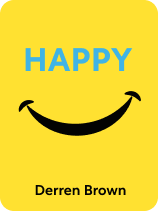

This article is an excerpt from the Shortform book guide to "Happy" by Derren Brown. Shortform has the world's best summaries and analyses of books you should be reading.
Like this article? Sign up for a free trial here.
What is the true meaning of happiness? What can we learn from the teachings of ancient philosophy?
In his book Happy, Derren Brown seeks to find the definition of a happy life, the philosophical building blocks we can use to achieve it, and the barriers that prevent us from living to our fullest. Brown’s approach is grounded in the philosophy of ancient Greek philosophers.
Keep reading to learn about Brown’s quest to solve the true meaning of happiness, based on philosophy.
What Is the True Meaning of Happiness?
We take it as a given that we want to be happy, but what is the true meaning of happiness? Derren Brown suggests that the answers can be found in the teachings of the ancient Greek philosophers for whom the quest for a happy, well-lived life was a practical problem to be solved. Brown says that by adopting a philosophy based on those of the Stoics and Epicureans, we can lead thoughtful, balanced, and more well-rounded lives.
As a magician, Brown isn’t a stereotypical self-help guru. However, his understanding of how stories misdirect us led to his belief that we can reshape our own narratives to be happy in the here and now while maintaining a positive outlook toward our own mortality. This article will examine Brown’s definition of the true meaning of happiness and the philosophical building blocks he claims can achieve it. We’ll compare Brown’s ideas to those of modern psychology and contrast his views with those of other happiness experts, some of whom he argues directly against.
Happiness Is a Balancing Act
Brown begins his quest for the true meaning of happiness by setting realistic expectations for what the idea of happiness means. As opposed to much of the modern self-help industry, with its focus on goal setting, self-affirmation, and relentless (sometimes unrealistic) positivity, Brown suggests that happiness can be found by living a life in which our desires are balanced with the realities we live in.
Much of life is a tug-of-war between various aspects of existence. In ourselves, there’s a conflict between our strengths and weaknesses. Externally, we’re caught in the struggle between what we want and life’s obstacles. For example, you may dream of starting a business that fills your life with meaning and makes you comfortably rich. However, random chance (such as market fluctuations) can keep success forever out of your grasp. Brown argues that either devoting all your energy to getting what you want or giving in to the capricious tides of fate both lead to a miserable existence. The true meaning of happiness can actually be found when we’re threading the needle between what we can and can’t control.
(Shortform note: Many thinkers have written about the difference between what you can and can’t control, but in How to Stop Worrying and Start Living, Dale Carnegie goes a step further and suggests that you cooperate with circumstances you can’t change. He says that instead of giving up in the face of adversity or fighting against it tooth and nail, you should shift your energy to the middle ground and find a way to work with your circumstances, hopefully turning an otherwise unhappy situation to your advantage.)
Brown asserts that the key to establishing this balance is to take control of the stories we tell ourselves. Some stories may tell us that everything is in our power, such as when we believe that we can make someone love us if only we try hard enough to win them over. Other stories tell us we’re the victims of fate, such as when we believe that we’re locked into a certain career path because that’s what our family expects.
(Shortform note: There’s no shortage of books promoting the narrative of personal power, from Niccolò Machiavelli’s The Prince to Robert Greene’s The 48 Laws of Power, which suggests that craving power over others is perfectly natural. While the Stoics would certainly disagree with that thesis, neither would they recommend a total abdication of power. In Meditations, Roman emperor and Stoic philosopher Marcus Aurelius balanced his immense political power with his duty to logos, the guiding force of nature.)
These stories serve a vital evolutionary function—they help us make sense of our lives so we’re not overwhelmed by a constant flood of details. Some stories are handed down by our parents and the culture we live in; others we create on our own. However, we often make the mistake of confusing our stories with reality and living our lives in such a way that confirmation bias reinforces our misperceptions. For example, if you’re told from a very young age that you’re not good at sports, you may never make the effort to improve your physical skills. Your story has become a self-fulfilling truth.
On the other hand, if you take control of your story, you can tell yourself that you can improve athletically despite any initial shortcomings you were born with. You can tell yourself that you can follow any career path you choose, while acknowledging that you might have to do so without your family’s support. You can tell yourself that after doing your best to win someone’s heart, there’s still no guarantee they’ll feel the same way.
(Shortform note: A self-fulfilling cycle of “learned helplessness” can begin when you face a stressful situation enough times that you internalize the belief that you’re powerless to escape it. People in this cycle will choose to endure the pain of it rather than attempt to find a way out. In Grit, Angela Duckworth argues that to counter learned helplessness, you need to reframe your perceptions to see the causes of your suffering as temporary and specific—and therefore manageable.)
While the modern world offers some tools, such as psychotherapy, for identifying and reclaiming our stories, Brown turns to the ancient Greek philosophers for guidance on how to do the same. In the Western world, it was Socrates who first said that we can know ourselves and enact change. If we become self-aware, we can change how we think, and if we change how we think, we can change how we feel. If choosing feelings is something we can do, who wouldn’t choose to be happy? To identify the true meaning of happiness, Brown zeroes in on Socrates’s intellectual descendants, the Stoics and the Epicureans, as offering the most useful blueprints for achieving contentment in the face of our daily struggles.
| The Business of Happiness While happiness was a chief concern of many ancient philosophies, it’s also the basis for the modern self-help industry. For example, in The Happiness Hypothesis, Jonathan Haidt says that we’re responsible for creating the conditions to be happy. In Designing Your Life, Bill Burnett and Dave Evans lay out an 11-step plan to do exactly that. Gretchen Rubin set out on a 12-month Happiness Project to find out if happiness can be improved by tweaking your life in small but significant ways. The self-help industry is currently worth over $10 billion in the US alone, and is only poised to grow as the millennial generation becomes more focused on personal improvement. While some of the practices recommended by self-help gurus draw from the same principles as Brown, there are others that go counter to Stoic philosophy. |

———End of Preview———
Like what you just read? Read the rest of the world's best book summary and analysis of Derren Brown's "Happy" at Shortform.
Here's what you'll find in our full Happy summary:
- The definition of happy, according to ancient Greek philosophers and Stoics
- The importance of balancing desires with realities
- How to overcome the three biggest barriers to happiness






